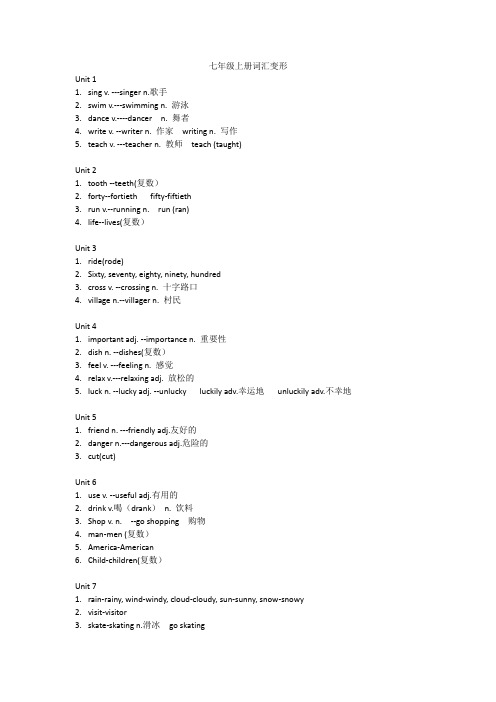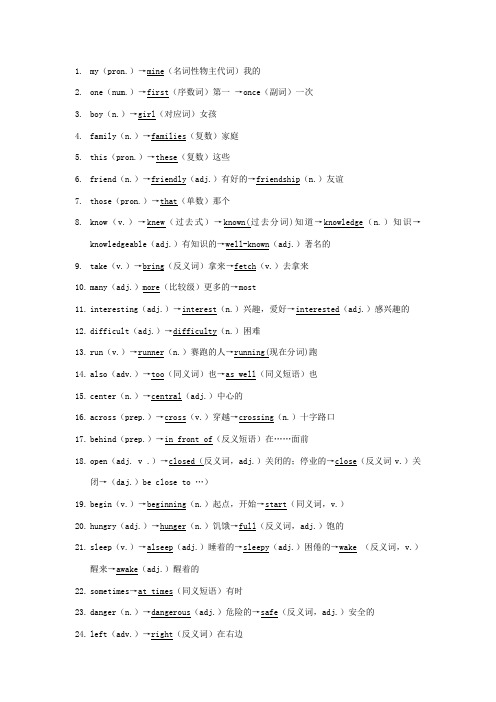词汇变形练习
- 格式:xlsx
- 大小:21.48 KB
- 文档页数:4

2020.年3月5日动词变名词1.动词加-er变成名词,如:2.动词加-or 变成名词,如:visit→visitor invent→inventor operate→operator direct→director act→actor3.动词加-tion 变成名词,如:4.动词加-ment变成名词,如:organize—organizationachieve→achievement advertise→advertisement agree→agreement excite→excitement move→movement improve→improvement develop→development treat→treatment5.动词加-ance变成名词。
如:appear→appearance perform→performance enter→entrance6.动词加-ing变成名词。
如:注意动词变名词的特殊形式:形容词与副词的原级、比较级和最高级类1.形容词和副词的比较级、最高级构成(1)单音节词与部分双音节词规则变变化:(2)部分双音节词或以形容词加-ly变成的副词和多音节词,在其前加more, most 变成比较级和最高级。
如:(3)不规则变化:2.原型:as+形容词或副词的原型+as “和……一样……”,not as / so+形容词或副词的原型+as “和……不一样……”。
基数词变序数词类主要掌握好1-12和20、30、40、50、60、70、80、90及21、22、23这几个序数词的形式:注意次数的表达:one-once two-twice three-three time否定前缀人称代词变化类要熟练掌握和运用主格、宾格、形容词性物主代词及名词性物主代词。
见下面表格:常见的反义词1.动词2.形容词常考的句式结构3.既可以跟动词不定式又可以跟动名词:4. 类型1)表示提建议的2) 特殊疑问词+动词不定式,如:注意:以上几点一般考查动词形式。

高考英语语法填空词汇变型练习81.escape (v.) (n.) 逃跑;逃避从…中逃脱逃避/避免某事2.devote (v.)把…奉献于(n.)忠心,奉献精神把某人的全身心奉献于… be devoted to sb 挚爱某人,对…全心全意3.intelligence (n.)智力, 聪明, 智能(a.)聪明的, 伶俐的, 有才智的intellectual (a.) (n.)4.guide (n.)领路人, 导游者(v.)指导, 支配, 管理, 带领(n.)指导, 领导the guidance of sb 在…的指引下5.hunt (v.)打猎, 搜寻(n.)打猎, 搜寻( (过去式)(过去分词)) (n.)猎人,搜寻者6.phenomenon (n.) 现象(复数)phenomena7.sense (n.) 感官,感觉,意义(v.)感觉到,检测(a.)敏感的, 易受影响的sense of sight/ touch/ smell/ hearing/ taste视觉/触觉/嗅觉/听觉/味觉责任感/成功感/如释重负讲得通,有意义make (a) sense of 弄懂8.rely (v.)依靠,信赖(a.)可信赖的,可依靠的依靠,依赖9.suggest (v.)建议;暗示(n.) suggested answer参考答案10.disadvantage (n.) 缺点,不利条件(a.)不利的,不便的n.优点take advantage of利用,占便宜st (vi.) (vt.)度过,使维持(a.)最后的,最近的(adv.)最后地(adv.)最后,终于(a.)持久的,永恒的在刚过去的几年里12.(v.) 品尝,尝起来tasty (a.)可口的= delicious13.music (n.)音乐, 乐曲musical (a.)音乐的, 悦耳的(n.)音乐剧(n.)音乐家te (a.) 迟的,晚的(a.)更迟的,更后的(adv.)后来,随后(a.)最晚的, 最新的,最近的lately (adv) 近来,最近上学/开会迟到inone’s late fifties 在某人快60岁时sooner or later 迟早最新消息Latest figures show that...最新数据表明15.expense (n.)消费,支出,代价(=costly /dear) (a.)昂贵的不惜代价做某事at one’s own expense自费at the expense of sb/sth 在牺牲……情况下,以……为代价16.distinguish (v.)辨别,区别distinction (n.) 差别= distinguish between A and B 区别AB17.practice (n.)实践,练习practice (v.) (a.)实际的,实用的练习做某事18.save (v.) 救,节省,储存;savings (n.)19.just (a.) (adv.)仅仅,只是,刚刚,恰好(n.)正义, 公平(v.)证明合法,替...辩护20.destroy (v.)破坏,毁坏(n.)buildings 被毁的建筑物对…造成破坏21.harmony (n.)和谐,协调, 融洽(a.)和谐的, 协调的, 和睦的(adv.)22.attention (n) 注意,专心(a)留意的,专心的(ad v.)23.brave (a.)勇敢的(n.)勇敢(反) coward (n.)懦弱的人, 胆小的人。

七年级上册词汇变形Unit 11.sing v. ---singer n.歌手2.swim v.---swimming n. 游泳3.dance v.----dancer n. 舞者4.write v. --writer n. 作家writing n. 写作5.teach v. ---teacher n. 教师teach (taught)Unit 21.tooth --teeth(复数)2.forty--fortieth fifty-fiftieth3.run v.--running n. run (ran)4.life--lives(复数)Unit 31.ride(rode)2.Sixty, seventy, eighty, ninety, hundred3.cross v. --crossing n. 十字路口4.village n.--villager n. 村民Unit 41.important adj. --importance n. 重要性2.dish n. --dishes(复数)3.feel v. ---feeling n. 感觉4.relax v.---relaxing adj. 放松的5.luck n. --lucky adj. --unlucky luckily adv.幸运地unluckily adv.不幸地Unit 51.friend n. ---friendly adj.友好的2.danger n.---dangerous adj.危险的3.cut(cut)Unit 6e v. --useful adj.有用的2.drink v.喝(drank)n. 饮料3.Shop v. n. --go shopping 购物4.man-men (复数)5.America-American6.Child-children(复数)Unit 71.rain-rainy, wind-windy, cloud-cloudy, sun-sunny, snow-snowy2.visit-visitor3.skate-skating n.滑冰go skatingUnit 81.pay(paid)2.cross- crossing3.easy adj. -easily adv. 容易地Unit 91.glass-glasses2.act-actor -actress3.art- aritist n.艺术家4.different-differently adv.不同地--difference n. 区别be different from 与......不同5.real adj. --really adv. 真正地Unit 101.lucky adj. luck n. Good luck!2.cut(cut) cut up 切碎Unit 111.ride(rode)2.feed(fed)3.grow(grew)4.exciting --excited interesting -interested5.expensive-cheap6.Slow-fastUnit 121.sheep 单复同形2.nature n. ---natural adj.3.fly(flew)4.wake(woke)。

词汇变形练习题词汇变形是学习语言中的重要部分,它可以帮助我们扩大词汇量、提高语言表达能力。
为了帮助大家更好地掌握词汇变形,下面为大家提供一些练习题,希望能够帮助到大家。
一、名词变形1. 表示“人”的名词单数形式:人类→ __________2. 表示“国家”的名词复数形式:国家→ __________3. 表示“孩子”的名词所有格形式:孩子→ __________4. 表示“教师”的名词复数形式:教师→ __________5. 表示“鱼”的名词复数形式:鱼→ __________6. 表示“天空”的名词复数形式:天空→ __________二、动词变形1. 表示“吃”的动词过去式:吃→ __________2. 表示“看”的动词第三人称单数形式:看→ __________3. 表示“学习”的动词进行时形式:学习→ __________4. 表示“写”的动词过去分词形式:写→ __________5. 表示“跑”的动词现在分词形式:跑→ __________6. 表示“打电话”的动词现在完成时形式:打电话→ __________三、形容词变形1. 表示“高”的形容词比较级形式:高→ __________2. 表示“美丽”的形容词副词形式:美丽→ __________3. 表示“快”的形容词最高级形式:快→ __________4. 表示“冷”的形容词名词形式:冷→ __________5. 表示“有趣”的形容词否定形式:有趣→ __________6. 表示“干净”的形容词程度副词形式:干净→ __________四、副词变形1. 表示“好”的副词形式:好→ __________2. 表示“快”的副词形容词形式:快→ __________3. 表示“远”的副词比较级形式:远→ __________4. 表示“频繁”的副词名词形式:频繁→ __________5. 表示“仔细”的副词否定形式:仔细→ __________6. 表示“完全”的副词程度副词形式:完全→ __________以上就是本次的词汇变形练习题,希望能够帮助大家巩固所学的知识。

1.my(pron.)→mine(名词性物主代词)我的2.one(num.)→first(序数词)第一→once(副词)一次3.boy(n.)→girl(对应词)女孩4.family(n.)→families(复数)家庭5.this(pron.)→these(复数)这些6.friend(n.)→friendly(adj.)有好的→friendship(n.)友谊7.those(pron.)→that(单数)那个8.know(v.)→knew(过去式)→known(过去分词)知道→knowledge(n.)知识→knowledgeable(adj.)有知识的→well-known(adj.)著名的9.take(v.)→bring(反义词)拿来→fetch(v.)去拿来10.many(adj.)more(比较级)更多的→most11.interesting(adj.)→interest(n.)兴趣,爱好→interested(adj.)感兴趣的12.difficult(adj.)→difficulty(n.)困难13.run(v.)→runner(n.)赛跑的人→running(现在分词)跑14.also(adv.)→too(同义词)也→as well(同义短语)也15.center(n.)→central(adj.)中心的16.across(prep.)→cross(v.)穿越→crossing(n.)十字路口17.behind(prep.)→in front of(反义短语)在……面前18.open(adj. v .)→closed(反义词,adj.)关闭的;停业的→close(反义词v.)关闭→(daj.)be close to …)19.begin(v.)→beginning(n.)起点,开始→start(同义词,v.)20.hungry(adj.)→hunger(n.)饥饿→full(反义词,adj.)饱的21.sleep(v.)→alseep(adj.)睡着的→sleepy(adj.)困倦的→wake (反义词,v.)醒来→awake(adj.)醒着的22.sometimes→at times(同义短语)有时23.danger(n.)→dangerous(adj.)危险的→safe(反义词,adj.)安全的24.left(adv.)→right(反义词)在右边25.dirty(adj.)→clean(反义词)干净的26.policeman(n.)→policewoman(对应词)女警察27.young(adj.)→old(反义词)年老的28.teach(v.)→teacher(n.)教师29.children(n.)→child(单数)孩子30.sun(n.)→cook(n.)厨师→cooker(n.)厨具31.terrible(adj.)→terribly(adv.)很糟的,非常地32.surprise(n. v.)→surprising(adj.)令人惊讶的→surprised(adj.)感到惊奇的33.bad(adj.)→badly(adv.)差地34.high(adj.)→height(n.)高度35.always(adv.)→never(反义词)忘记36.wait(v.)→waiter(n.)(服务员)→waiting(现在分词)等待37.visit(v.)→visitor(n.)游客38.sit(v.)→sitting(动词的现在分词)坐,使坐下39.suggest(v.)→suggestion(n.)建议;意见40.expensive9(adj.) →dear(同义词)贵的→cheap(反义词)便宜的→inexpensive41.crowd(v. n.)→crowded(adj.)拥挤的→uncrowned(adj.)反义词)不拥挤的42.decide(v.)→decision(v.)决定43.discuss(v.)→discussion(v.)议论;讨论44.agree(v.)→disagree(反义词)不同意→agreement(n.)同意45.color(n.)→colorful(adj.)色彩鲜艳的46.outside(adv.)→inside(反义词)里面(的)47.loud(adj.)→loudly(adv.)大声地48.healthy(adj.) →unhealthy(反义词)不健康的→health(n.)健康(状况)49.different(adj.)→difference(n.)不同;差异;区别→same(反义词adj.)相同的50.tooth(n.)→teeth(复数)牙齿51.ill(adj.)→illness(n.)疾病;身体不适→sick(同义词adj.)(身体)不舒服的52.west(n.)→western(adj.)西方的;来自西方的53.important(adj.)→importance(n.)重要性54.plan(n. v.)→planning(现在分词)→planned(过去分词)计划55.famous(adj.)→well-known(同义词)著名的56.nature(n.)→natural(adj.)自然地57.tour(v.)→tourist(n.)旅行者58.quick(adj.)→quickly(adv.)快地→slowly(反义词)慢地59.worry(v.)→worried(adj.)担心的,焦虑的→worrying(adj.)令人担忧的60.invite(v.)→invitation(n.)邀请的;邀请书61.train(v.)→training(n.)训练;锻炼;培训62.interest(v. n.)→interesting(adj.)令人感兴趣的→interested(adj.)感兴趣的63.care(v.)→careful(adj.)仔细的→carefully(adv.)仔细的,认真地→careless(adj.)粗心的e(v.)useful(adj.)有用的→used(adj.)用过的65.begin(v.)→beginning(n.)开始66.excite(v.)→excited(adj.)激动地;兴奋的→exciting(adj.)令人兴奋的67.safe(adj.)→safety(v.)安全→dangerous(反义词)危险的68.cut(v.)→cutting(现在分词)切;割69.finally(adv.)→at last/in the end(同义词组)最后70.mix(v.)→mixture(n.)混合物71.salt(n.)→salty(adj.)咸的72.gift(n.)→present(同义词)礼物(n.)73.win(v.)→winner(n.)获胜者→lose(反义词)输→beat(v.)74.luckily(adv.)→fortunately(同义词)幸运地→lucky(adj.)幸运的→luck(n.)幸运75.wet(adj.)→dry(反义词)干燥的→wetter(比较级)更湿的76.act(v.)→actor(n.)行动→active(adj.)积极地77.art(n.)→artist(n.)艺术家78.travel(v.)→traveler(n.)旅客79.fit(adj.)→healthy(同义词)健康的80.build(v.)→building(n.)建筑物→builder(n.)建住者81.meet(v.)→meeting(n.)会议、集合fort(v.)→comfortable(adj.)舒适的;安逸的83.with(prep.)→without(反义词)没有84.love→lovely(adj.)可爱的→loving(adj.)慈爱的85.nation(n.)→national(adj.)国家的,民族的86.alive(adj.)→dead(反义词)死的87.easy(adj.)→difficult(反义词)难的88.build(v.)→built(过去式与过去分词)89.alone(adv.)→lonely(近义词)寂寞的;孤单的90.able(adj.)→ability(n.)能力→unable(unable(adj.)不能的91.pleasant(adj.)→unpleasant(反义词)→pleasure(n.)高兴92.science(n.)→scientist(n.)科学家→scientific(adj.)科学的93.possible(adj.)→impossible(反义词)不可能的→possibly(adv.)可能地94.surprise(v. n.)→surprising令人惊奇的→surprised(adj.)感到惊奇的95.fail(v.)→failure(n.)失败96.include(v.)→including(prep.)包括97.free(adj.)→freedom(n.)自由98.strange(adj.)→stranger(n.)陌生人99.follow(v.)→following(adj.)下列的100.amaze(v.)→amazing(adj.)令人惊奇的→amazed(adj.)感到惊奇的101.scare(v.)→be afraid of(同义短语)害怕102.happen(v.)→take place(近义短语)发生103.silence(n.)→silent(adj.)寂静的;沉默的104.mean(v.)→meaning(n.)意思;含义→meaningful(adj.)有意义的105.hero(n.)→heroes(复数)英雄106.fly(v.)→flight(n.)飞行107.true(adj.)→truly(adv.)真正地→truth(n.)真实,真相108.own(adj.)→owner(n.)所有者,物主109.decide(v.)→decision(n.)决定;决心anize(v.)→organizer(n.)组织者→organization(n.)组织111.against(prep.)→for(反义词)支持112.injure(v.)→injured(adj.)受伤的113.collect(v.)→collector(n.)收藏者→collection(n.)收藏114.write(v.)→writer(n.)作者;作家115.Europe(n.)→European(n.)欧洲人(adj.)欧洲的116.Foreign(adj.)→certainly(adv.)当然;肯定117.Quite(adj.)→quiet(形近词)安静的118.Wait(v.)→waiter(n.)男服务生→waitress(n.)女服务生119.Annoy(v.)→annoyed(adj.)生气的;羞恼的→annoying(adj.)讨厌的;恼人的120.Polite(adj.)→rude(反义词)→politely(adv.)121.Behave(v.)→behavior(n.)行为fort(v.)→comfortable(adj.)舒服的→uncomfortable(反义词)不舒服的123.Person(n.)personal(adj.)个人的124.Mouse(n.)mice(pl.)老鼠125.Advantage(n.)→disadvantage(反义词)不利条件;缺点126.Choose(v.)→chose(过去式)→chosen(过去分词)→choice(n.)选择127.Enter(v.)→entrance(n.)入口128.Win(v.)→winner(n.)胜利者129.Neither(pron.)→both(pron.反义词)两个都130.Attract(v.)→attraction(n.)有吸引力的事物(或人)131.Especial(adj.)→especially(adv.)特别,尤其132.Discover(v.)→discovery(n.)发现→discoverer(n.)发现者133.Require(v.)→requirement(n.)要求,必要条件134.Wonder(n.)→wonderful(adj.)几号的135.Simple(adj.)→simply(adv.)仅仅,简单的136.Nature(n.)natural(adj.)自然地,自然界的137.Cross(v.)→across(prep.)穿过→crossing(n.)十字路口138.Low(adj.)→high(adj.反义词)高的139.Little(adj.)→least(最高级)最少的;最小的140.Pronounce(v.)→pronunciation(n.)发音141.Memory(n.)→memorize(v.)记忆142.Different(adj.)differently(adv.)不同的143.Frustrate(v.)→frustrating(adj.)令人失望的→frustrated感到失望的144.Solve(v.)→solution(n.)解决(办法)145.Impress(v.)→agreement(n.)协定;协议→(反义词)disagreement分歧146.Develop(v.)development(n.)发展147.Important(adj.)→unimportant(反义词)不重要的→importance(n.)重要性148.Die(v.)death(n.)死,死亡→dead(adj.)死的→dying(现在分词)149.Patient(adj. n.)→patience(n.)耐心,毅力150.Decide(v.)→decision(n.)决心151.Exact(adj.)→exactly(adv.)准确的152.Possible(adj.)→possibly(adv.)可能地,也许153.Anxious(adj.)worried(同义词)焦虑的154.Happy(adj.)→unhappy/unpleasant(反义词)不快乐的,不愉快的的→happily (adv.)快乐地,高兴的155.Noise(n.)→noisy(adj.)吵闹的156.Direct(adj.)→director(n.)主管;主任157.Honest(adj.)→dishonest(反义词)不诚实的158.Itself(pron.)→themselves(复数)他们自己159.Suggest(v.)→suggestion(n.)建议,提议160.Taste(n.)→tasty(adj.)味道好的161.Main(adj.)→mainly(adv.)主要地,首要的162.Interview(v.)interviewer(n.)采访者163.Tire(v.)→tired(adj.)感觉疲倦的→tiring(adj.)令人疲劳的cate(v.)→education(n.)教育→educational(adj.)教育的;有教育意义的165.Peace(n.)→peaceful(adj.)平静的;宁静的166.Tour(v. n.)→tourist(n.)游客→touristy(adj.)吸引游客的167.Live(v.)→lively(adj.)充满活力的168.Include(v.)→including(prep.)包含;包括169.Translate(v.)translator(n.)翻译员→translation(n.)翻译170.Conclude(v.)→conclusion(n.)结论171.Hunger(n.)hungry(adj.)饥饿的172.Home(n.)homeless(adj.)无家可归的173.Advertise(v.)advertisement(n.)广告、广告活动174.Special(adj.)→specially(adv.)特意的;专门的175.Imagine(v.)→imagination(n.)想象176.Donate(v.)→donation(n.)捐赠物177.Invent(v.)→inventor(n.)发明家→invention(n.)发明178.Operate(v.)→operation(n.)手术179.Salt(n.)→salty(adj.)咸的,含盐的180.Produce(v.)→product(n.)产品→production(n.)生产181.Create(v.)→creative(adj.)有创造力的182.Wood(n.)wooden(adj.)木制的183.Popular(adj.)popularity(n.)普及,流行184.Embarrass(v.)→embarrassed(adj.)尴尬的→embarrassing(adj.)令人尴尬的185.Announce(v.)→announcement(n.)布告,公告186.Convince(n.)→convincing(adj.)令人信服的187.Farm(v.)→farmer(n.)农夫,农场主188.End(v.)→ending(n.)结尾;结局189.Wonder(v.)→wonderful(adj.)令人惊奇的→wonderfully(adv.)令人惊奇的190.Lead(v.)→leader(n.)领导者191.Greet(v.)greeting(n.)问候192.Familiar(adj.)→unfamiliar(反义词)不熟悉的;陌生的193.Most(adj.)→mostly(adv.)多半;主要的;通常194.Proper(adj.)→properly(adv.)适宜的;恰当的195.Normal(adj.)→normally(adv.)通常;正常的196.Endanger(v.)→endangered(adj.)有绝种的危险;濒临灭绝的197.Shine(v.)→shiny(adj.)有光泽的;发亮的198.Guilt(n.)→guilty(adj.)内疚的;有罪的199.Think(v.)thought(n.)思想;想法;考虑;关心200.Wood(n.)wooden(adj.)木制的→woods(n.)树林201.Appear(v.)→disappear(反义词)消失→appearance(n.)出现,露面202.South(n.)→southern(adj.)南方的;在南方的203.Strong(adj.)→strongly(adj.)被污染的→pollution(n.)污染204.Express(v.)→expression(n.)词语;表达方式;表达205.Pride(n.)→proud(adj.)自豪的;骄傲的206.Pull(v.)→push(反义词)推。

Unit 4 词汇(变形)、短语、句型与语法练习一.语法复习( )1.There is a bank _________ our school.A.on B.far C.near D.over( )2.—Where is your schoolbag? —It’s ________ my room ________ the floor.A.in; in B.in; on C.on; on D.on; in( )3.——________ do you live? I live in London.A.What B.When C.How D.Where( )4.Look! The apples are ________ the table.A.in B.on C.under D.at( )5.—Look! What’s ________ the tree? —It’s a bird.A.in B.on C.at( )6.—Excuse me, _______ is the hospital? —Go along the road to the end.A.where B.which C.how( )7.—________ is Ben’s kite? —It’s under the bed.A.How much B.What color C.Which D.Where( )8.Please write your name ________ the blackboard ________ English.A.on, with B.on, of C.on, in D.in, on( )9.I am a tidy girl. My CDs are ________ the bookcase and my shoes(鞋子) are ________ the bed.A.in; on B.for; under C.in; under( )10.There is a blackboard _________ the wall.A.in B.at C.on D.behind( )11.There is an art room ________ my school.A.on B.in C.of( )12.The basketball is _______ the bed.A.under B.at C.in D.with( )13.—Where is my schoolbag, Mum? —Your schoolbag is ________ the desk.A.to B.of C.at D.on( )14.—Where is your hat? —Oh, it’s always ________ the chair.A.of B.under C.for D.at( )15.This morning, Tom found a set of keys ________ the school library.A.on B.of C.in D.under二、词汇复习(1).根据汉语意思或者首字母提示,用相应单词的适当形式填空。
八年级英语下册词汇变形综合练习班级考号姓名总分Unit 11.I’m used to______________(live) in the north.2.___________(knife) are used for cutting things.3.We all know the _____________(important) of keeping healthy.4.——Let’s go mountain climbing this weekend, shall we?——OK, but I must ask my parents first, then I’ll make a ____________(decide).5.I saw him___________(play) computer games when I went into the room.6.I have a ___________(stomach) and can’t eat anything now.7.She ____________(hurt) herself when she was running yesterday morning.8.——How many _________(tooth) does the baby have? ——Only two.9.My mother expected me ________(study) in the USA.10.I saw Jack ______________(clean) the classroom when I came in.11.——Why are you so hungry?——I came to school without________(eat) food this morning.12.They all agreed _________(play) soccer with us that day because the weather was very cold.13.I am used to ________(get) up early and I am never late for school.14.Don’t give up _________(sing). I sing your dream can come true one day.15.No one knew the __________(mean) of the sentence.Unit 21.Staying with animals often gives me a ____________(feel) of fear.2.Tom is the ___________(own) of the car. He has had it for two months.3.He smiled in _____________(satisfied) when he won the game.4.Where there is a ______________(difficult), there is a way out.5.The players are in ___________(train) for the next match.6.My friend Mary volunteered____________(give) me some money to buy the book.7.They have to put off__________(go) on vacation because of the bad weather.8.Our grandparents used ____________(live) a hard life because they were poor.9.We should try our best to help these __________(home) children.10.He spent too much money ____________(repair) the old bicycles.11.My bicycle is___________(break), I need to ask my father to repair it.12.We all love the old woman because of her _______________(kind).13.——How long is your basketball ___________(train)?—— Two hours.14.—— Why are you so _____________(exciting)? ——Because our team won the game.15.Your help made it possible for him___________(go) to college.Unit 31.Our teacher ____________(not be) happy if she sees the mess in the classroom.2.——When did you finish ____________(write) the book? ——Last week .3.We need ___________(clean) our classroom twice a day.4.He is very thirsty(口渴的). Two cups of water ________(be) not enough for him.5.Many boys hate ___________(do) housework.6.She will travel all over the world as soon as she __________(leave) school.7.“You can’t play computer games all day and night.” the mother said_______(angry) to her son.8.Neither of them __________(like) doing chores, so their room is very untidy.9.Do you often invite your cousin_________(go) fishing?10.The boy practices the guitar for a long time every day in order to ________(win) the competition.11.It’s hard for her__________(dance) well because she is blind.12.Mr. Wang is trying his best to develop his son’s________________(independent).13.The _________(long) you stay with Mr. Hand, the happier you will be.Unit 41.——I can’t play the piano well. What should I do?——Why don’t you ________(ask) your music teacher to help you?2.——What can we do for fun this afternoon?——How about _______(go) swimming?3.Do your parents allow you ________(stay) out late?4.I think you should sit down and have a good___________(communicate) with your best friend.5.My _____(old) brother helps me play basketball every day.6.When my parents argue, it’s like a black cloud________(hang) over my home.7.I don’t mind my brother borrowing my books. However, he should let me ______(read) his book.8.My sister always borrows my things without ___________(return). What should I do?9.He always gave me some_________(advice) when I had problems.10.The club provides all kinds of_________(activity) including tennis, swimming and so on.11.W e should learn from each other __________(improve) our English.12.Doctors say too much pressure is not good for a child’s___________(develop).13.We need more free time, but we are sometimes __________(busy) on weekends than weekdays.14.My parents want me to be__________(success), they are strict with me.15.___________(compete) between children brings then a lot of pressure these days.16.Parents often take their kids to football________(train) on weekends.17.When did you start _________(play) the guitar?18.——I think Mike is a lazy boy.——I _________(agree). In fact, he is hard-working at school.19.Jack always takes a shower before________(go) to bed.附:参考答案Unit 1living;knives,importance,decision,playing,stomachach,hurt,teethto study,cleaning,eating,to play,getting,singing,meaningUnit 2feeling,owner,satisfaction,difficulty,training,to give,going,to livehomeless,repairing,broken,kindness,training,excited,to goUnit 3will not be ,writing,to clean,is ,doing,leaves,angrily,likes,to go ,win,to dance,independence,longerUnit 4ask,going,to stay,communication,elder,hanging,read,returning,advice,activities,to improve,development,busier,successful,competition,training,playing disagree,going。
七年级英语词汇变形单选题60题答案解析版1.She has two_____.A.pencil boxsB.pencil boxesC.pencils boxD.pencils boxes答案:B。
“pencil box”变复数时,“pencil”不用变复数,“box”的复数是“boxes”,所以是“pencil boxes”。
2.There are many_____in the classroom.A.deskesB.desksC.deskD.desk's答案:B。
“desk”的复数是“desks”。
3.My sister has three_____.A.knifesB.knivesC.knifeD.knife's答案:B。
“knife”的复数是“knives”。
4.There are some_____on the table.A.bookesB.booksC.bookD.book's答案:B。
“book”的复数是“books”。
5.He has four_____.A.boxesB.boxsC.boxD.box's答案:A。
“box”的复数是“boxes”。
6.There are a lot of_____in the school.A.studentesB.studentsC.studentD.student's答案:B。
“student”的复数是“students”。
7.My brother has two_____.A.watchsB.watchesC.watchD.watch's答案:B。
“watch”的复数是“watches”。
8.There are some_____in the park.A.treeesB.treesC.treeD.tree's答案:B。
“tree”的复数是“trees”。
9.She has three_____.A.applesB.appleC.apples'D.apple's答案:A。
七年级英语词汇变形单选题60题1. There are many ______ (apple) on the tree.A. applesB. appleC. applessD. an apple答案:A。
本题考查名词的复数形式。
apple 是可数名词,复数形式是apples,B 选项是单数形式,C 选项形式错误,D 选项an apple 是一个苹果,many 修饰复数名词,所以选A。
2. I have two ______ (book) in my bag.A. booksB. bookC. bookesD. a book答案:A。
这里考查book 的复数形式,book 的复数是books,B 选项是单数,C 选项拼写错误,D 选项a book 是一本书,two 表示两个,要用复数,所以选A。
3. We can see some ______ (child) in the park.A. childsB. childrenC. childD. a child答案:B。
child 的复数形式是children,A 选项拼写错误,C 选项是单数,D 选项a child 是一个孩子,some 表示一些,要用复数,所以选B。
4. How many ______ (box) are there on the desk?A. boxsB. boxesC. boxD. a box答案:B。
box 的复数形式是boxes,A 选项拼写错误,C 选项是单数,D 选项a box 是一个盒子,many 修饰复数名词,所以选B。
5. My sister has three ______ (pencil).A. pencilsB. pencilC. pencilesD. a pencil答案:A。
pencil 的复数形式是pencils,B 选项是单数,C 选项拼写错误,D 选项a pencil 是一支铅笔,three 表示三个,要用复数,所以选A。
中考英语词汇拼写与变形单选题40题1.There are many beautiful flowers in the garden.________ are very colorful.A.TheyB.ThemC.TheirD.Theirs答案:A。
本题考查人称代词主格的用法。
“flowers”是复数名词,在句子中作主语,所以用主格“They”。
“Them”是宾格,不能作主语;“Their”是形容词性物主代词,后面需接名词;“Theirs”是名词性物主代词,相当于“their+名词”。
2.This is________ room. It's very clean.A.Lily and Lucy'sB.Lily's and Lucy'sC.Lily's and LucyD.Lily and Lucy答案:A。
本题考查名词所有格的用法。
如果表示两个人共同拥有某物,只在最后一个人名后加“'s”;如果表示两个人分别拥有某物,则两个人名都要加“'s”。
这里表示两人共同的房间,所以用“Lily and Lucy's”。
3.I have two________. They are very cute.A.dogC.dogesD.dog's答案:B。
本题考查名词复数的用法。
“two”表示两个,后面的名词要用复数形式,“dog”的复数是“dogs”。
“doges”不是“dog”的正确复数形式;“dog's”是“dog”的所有格形式。
4.The________ of the book is very interesting.A.storyB.storiesC.storysD.storyes答案:A。
本题考查名词的单数形式。
“is”表明主语是单数,“story”的复数是“stories”,“storys”和“storyes”都是错误的变形。